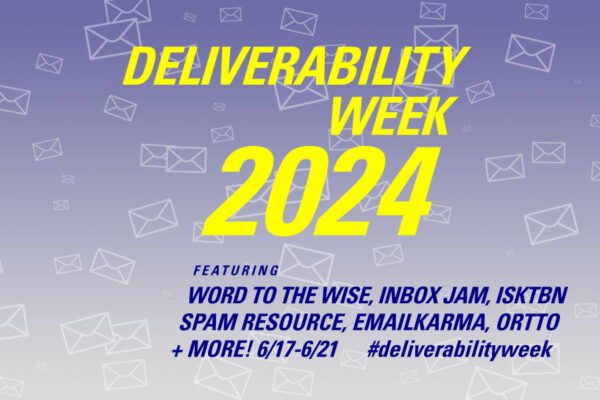Email is hard. Let me say it again: EMAIL IS HARD, and that is why deliverability matters. At least, that is why deliverability should matter to everyone. It is also the reason that several of us decided to launch Deliverability Week to help spread the word on topics ranging from general best practices, authentication, consent practices, and more email-related goodness.
How Did I Get Here?
I started in email in October 2000, working in the network operations team of a (at the time) large ESP. In mid-2002, I was tasked with ensuring that the mail queues were not filling up and causing the systems to become unstable. Around this time, we also saw the development of email authentication, IP reputation, and feedback loops. All of these rapidly became confusing and hard to set up, requiring experts and specialists to help configure these services. Then it just kept piling on with the likes of Sender-ID (obsolete), Domain Keys (obsolete), Internet Identified Mail (obsolete), which combined to become DomainKeys Identified Mail (DKIM), DMARC, BIMI, MTA-STS, DANE, etc. The list just keeps getting longer and more complicated. Modern-day authentication is rather complicated, and there are lots of bad practices out there related to these services.
After a while, I got interested in privacy, the silent partner of deliverability, getting involved with understanding the laws that impact all the pieces of email marketing and data management: CASL, GDPR, CAN-SPAM, PIPEDA, and more. From 2008 onward, I’ve been assisting marketing teams with more than just deliverability. In the world of email marketing, you should know the basics and work with a professional when you need to get beyond just hitting send.
Why Deliverability Is Important
If you want your email program to be successful, you need to nurture it and treat it like the valuable asset it really is. Multiple studies put the ROI on email around $38-41 for each dollar spent. Numbers vary from study to study, but this is not an unreasonable range. With numbers like these, it makes sense to want your email list to be as large as possible, but that is where the deliverability magic happens.
Key Points on Email Deliverability
In closing, I’ll leave you with these ideas around email deliverability and why it is crucial for marketers to understand the basics and work with a professional as needed:
- Effective Delivery: Ensures your emails reach the intended recipients’ inboxes rather than getting lost in spam folders. This is essential for maintaining open lines of communication with clients, customers, and stakeholders.
- Reputation Management: High deliverability rates help maintain a positive sender reputation. Internet Service Providers (ISPs) monitor your sending habits, and consistent delivery issues can damage your reputation, making it harder to reach inboxes in the future.
- Maximizing Engagement: Higher deliverability means more recipients see your emails, leading to better engagement rates. This translates to higher open, click-through, and conversion rates, ultimately driving better results from your email campaigns.
- Cost Efficiency: Poor deliverability can waste resources, as you’re essentially paying to send emails that never reach their destination. Ensuring good deliverability means getting the most out of your email marketing budget.
- Legal Compliance: Adhering to best practices in email deliverability helps ensure compliance with laws and regulations like the CAN-SPAM Act, GDPR, and other anti-spam legislation. Non-compliance can lead to legal repercussions and fines.
- Customer Trust: Consistently reaching inboxes helps build and maintain trust with your audience. If customers expect your emails and don’t receive them, they may perceive your brand as unreliable.
Be sure to check out the others also participating in #DeliverabilityWeek, including:
– Steve and Laura from Word to the Wise
– Al from Spam Resource
– Jen from ISKTBN
– Mickey from Spamtacular
– Brad from Delivery Counts
Many others are also participating in Deliverability Week. Collectively, we are covering a wide range of topics, and you should see things from their perspectives.


